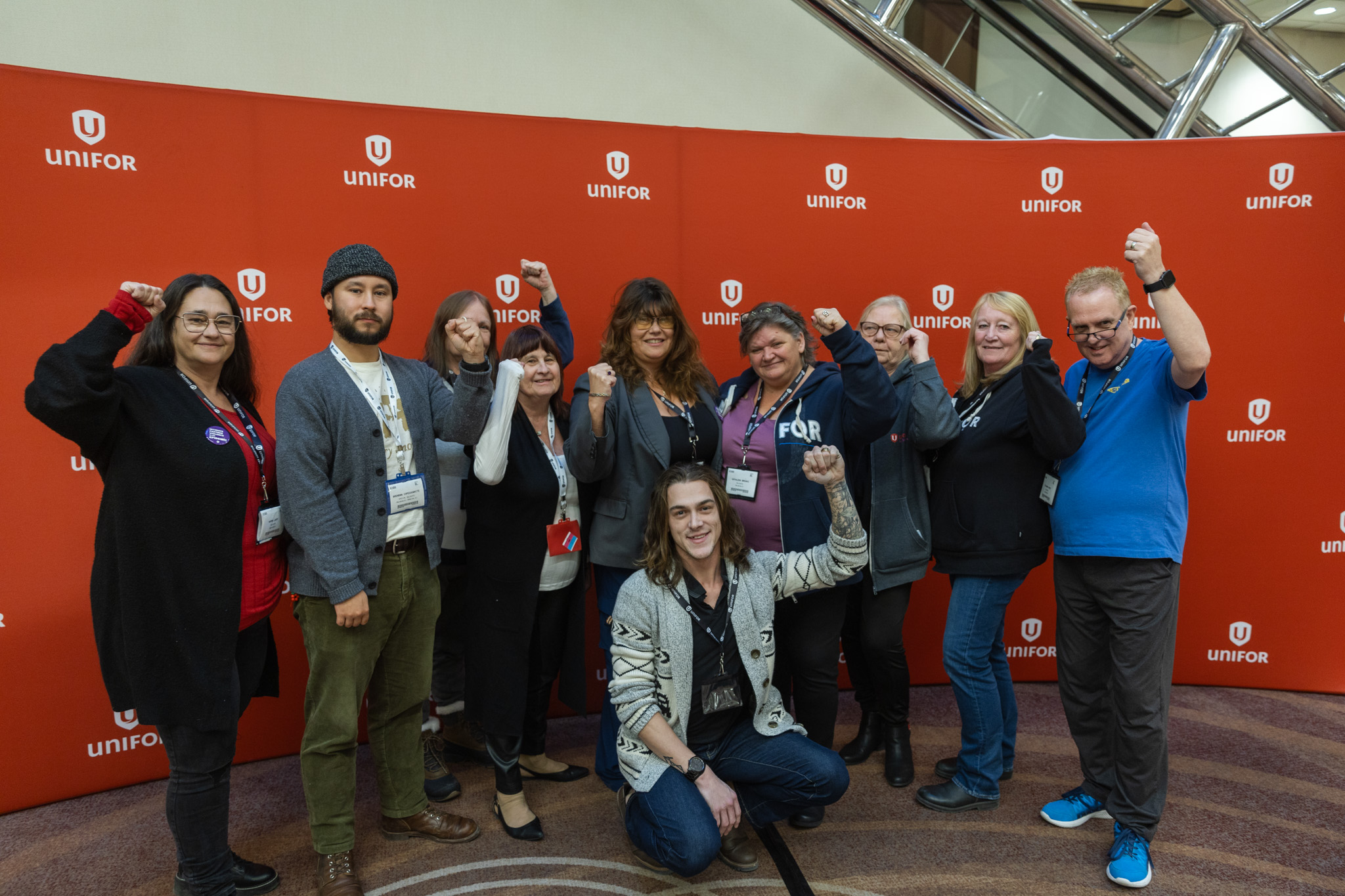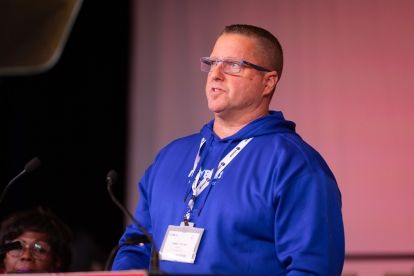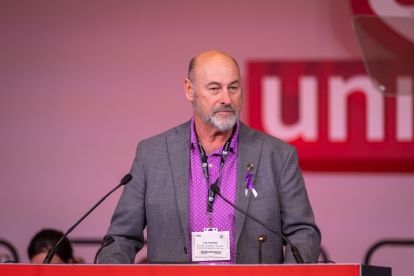
Share
The first day of the 2024 Ontario Regional Council fell on December 6, the National Day of Remembrance and Action on Violence Against Women in Canada.
“It has been over 30 years since 14 young women were murdered at Polytechnique Montréal, a violent act of misogyny that shook our country and led to the recognition of December 6,” said Shinade Allder, Unifor Ontario Regional Council Chair.
“As we mourn their loss, we renew our commitment to fight the hatred and misogyny that still persist today. In Canada and around the world, women, girls, MMIWG and 2SLGBTQI+ individuals continue to face unacceptable violence and discrimination. This day is not only for remembering those we have lost, but for taking action.”
In her address, Ontario Regional Director Samia Hashi said Unifor launched a campaign to get Intimate Partner Violence (IPV) declared an epidemic in the province.
The union held an IPV symposium in Windsor, on Nov. 25, the International Day for the Elimination of Violence Against Women, where 150 women from across Ontario met to engage on this critical issue and show their support for the cause.
“When we share our stories, when we talk openly about our experiences, it creates a space where victims feel safe to seek support and escape cycles that too often lead to tragic outcomes,” said Hashi.
“Legislation leads to awareness, awareness leads to action, and action leads to saving lives and protecting people from violence.”
Support for Victims of Intimate Partner Violence in Ontario is one of six recommendations by the Ontario Regional Director, which urges the Doug Ford government to immediately pass Bill 173 and officially declare IPV an epidemic.
In a powerful moment, one by one, 60 Unifor leadership and delegates approached a candlelit table at the front of the stage and laid a purple rose on it, each symbolizing a life lost to intimate partner violence in only one year, that the government has failed by not acting.
Keynote speaker Fartumo Kusow, a tireless advocate against gender-based violence, shared her story of loss after the tragic murder of her 36-year-old daughter, Sahra Bulle in May 2023.
Bulle’s estranged husband of 18 years was charged with first-degree murder, fueling Kusow’s commitment to advocacy and prevention.
During the 18 years leading up to her daughter’s death, Kusow said she found herself waiting in a system that failed them both. Bulle repeatedly tried to leave the abusive relationship and stayed at a local shelter in Windsor.
Sahra was reported missing on May 26, 2023, and her body was located over a week later.
As the mother of an adult, information that she tried to share about what she knew of her daughter’s relationship with doctors, therapists, and police, and Canadian border guards was not accepted. She said each time these systems prioritized privacy protection over physical and financial safety. She believes if she had, her daughter would have been alive today.
“I was on that train alongside my daughter, barrelling off the tracks,” said Kusow. “I knew it was no good.”
Kusow implored delegates to find the courage to act if they’re aware of violence around them.
“I realized, there is no hero coming in, wearing a cape. Especially when we have an Ontario government that says this is not an epidemic,” she said.
“I’m sick and tired of waiting and being silent and silenced…Together, we can create a world where no one has to wait.”
The two-day ORC opened with an Indigenous welcome by Elder Gilbert Sunday and the All Nations Junior Drummers.
Mental health and suicide prevention was another key focus at the council.
Members of the Unifor Employee and Family Assistance Program (EFAP) Standing Committee held a tribute for National Representative Mike Kemp, who died by suicide earlier this year.
“I got to see the work he did for members in the community,” said John D’Agnolo, President of Unifor Local 200.
“He was hurting. When you look near the end, in his struggle with mental illness, he fought like hell. I want everyone to know that, because this is a disease that doesn’t go away…He’ll never be forgotten.”
Unifor Local 302 member and active front line paramedic Shaun Taylor told delegates in his keynote speech that he co-founded #IveGotYourBack911 a decade ago – a campaign to raise awareness of First Responder mental health issues, including PTSD and other mental stress injuries experienced on the job.
“The average person in North America sees between three to five traumas in their lifetime,” he said. “The average first responder sees an average of 300 to 500 traumas during their career.”
The campaign has become a worldwide movement to provide a safe, online community where first responders could share resources and offer support about their daily challenges. They’ve since raised almost $1 million from merchandise sales to benefit organizations to support first responders with mental health issues.
Taylor said his organization lobbied the Ontario government in 2016 for Bill 163, which creates a statutory presumption that PTSD diagnosed in first responders is work-related, unless otherwise shown. This allows responders easier access to mental health benefits.
“Previous to this bill, because I am a paramedic and I have a diagnosis of PTSD, I had to prove what call I received my diagnosis,” said Taylor. “Not the 15 years I’ve been doing this job or the hundreds of thousands of traumas I’d been witness to.”
Ontario Regional Director Samia Hashi also spoke of other Unifor wins this year, including unionizing warehouse workers at a Mississauga Walmart, federal anti-scab legislation, and the continued work to get all provinces to adopt their own anti-scab laws.
She highlighted the federal government’s announcement of TTC funding and the expectation these subway cars will be built by Unifor members at the Alstom plant in Thunder Bay, and how the union put pressure on the Shaw Centre in Ottawa to allow taxi cab drivers access to washroom facilities.
Hashi said she will continue fighting for an improved health care system and emphasized the importance of members voting in the upcoming elections.
“When we work together, we can end hallway health care,” she said.
“We end the era of employers who think they are above the law…I won’t stand here and tell you how to vote, but I will be on the ground with you, every day, to make sure that workers issues are on this ballot. Because we need politicians to know that we’re not messing around.”
The second recommendation from the Ontario Regional Director was a renewed focus on advocating for public health care in Ontario.
Unifor National Secretary-Treasurer Len Poirier shared the importance of the international work the union does, including representation at the International Transport Workers Federation Congress in Morocco.
Unifor can build on existing global campaigns, including Get ME Home Safely, World Toilet Day, and Safe Rates, to raise solidarity and strength for education and bargaining strategies.
“Never was the need for workers to come together for international solidarity greater, when so many of our sectors – especially in transportation are controlled by multi-national corporations that control the wealth and have such influence on governments and regulations around the world,” said Poirier.
“Some of our Unifor initiatives are leading the way and we have already been recognized for this great work and sharing our work is exciting.”
Poirier also talked about how strong language in collective agreements and ensuring it’s being followed by employers can harness the effects of AI in the workplace.
“AI may feel like rocket science but defending our work and our right to good jobs and income security is not,” he said.
The first day of the council finished with a stand-up set from Canadian Association of Stand-up, Sketch and Improv Comedians founding member Sandra Battaglini and CASC 2nd Vice-President Amy Cunningham.
Earlier this year, Unifor welcomed CASC as a Community Chapter, which helps workers who can't form recognized unions to still work collectively, build solidarity, and access some group benefits.











